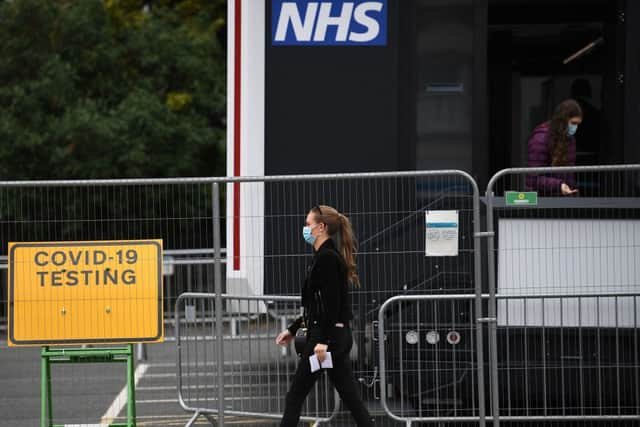What are the new Covid rules? When does £500 self isolation payments and free testing end in England
and live on Freeview channel 276
The Prime Minister has set out his plan for ending the final legal Covid restrictions in England, which will see self-isolation and free testing axed.
Boris Johnson presented his ‘living with Covid’ strategy to MPs on Monday (21 February) afternoon, after a last-minute delay to ministers signing off on the proposals.


Advertisement
Hide AdAdvertisement
Hide AdHe told the Commons it was time to “move from government restrictions to personal responsibility”, but warned that the pandemic is “not over” and there may be “significant resurgences” in infections in the future.
The rules changes will take effect in England over the coming weeks as remaining restrictions are eased.
These are all the key dates you need to know.
When will self-isolation end?
As of Thursday 24 February, it will no longer be a legal requirement to self-isolate after testing positive for Covid.
However, the official public health advice will remain that people who have coronavirus should stay at home for five days.
Advertisement
Hide AdAdvertisement
Hide AdThis advice applies to both adults and children, but crucially, the guidance will not be enforced by law. As such, people will not face a fine for leaving isolation.
The government will also no longer ask vaccinated contacts, and those under 18, to test for seven days, and will remove the legal requirement for contacts who are not vaccinated to self-isolate.
There will also be an end to contact tracing.
When will free Covid tests end?
For now, free Covid tests will continue to be available, but this will change at the beginning of April.
Mr Johnson has said that provision of free tests cannot continue at their current rate due to the cost of £2 billion per month.
Advertisement
Hide AdAdvertisement
Hide AdAs such, free universal symptomatic and asymptomatic testing will end for the general public from 1 April.
Remaining symptomatic testing will be focused on the most vulnerable, with the UK Health Security Agency (UKHSA) set to determine the details.
People over the age of 80 and the immunosuppressed are expected to be among those who will still have access to free tests.
A degree of asymptomatic testing will also be maintained in the most risky settings, such as in social care.
Advertisement
Hide AdAdvertisement
Hide AdThe UKHSA will maintain an appropriate level of lab infrastructure to be able to dial back up PCR testing if needed, as well as stockpile of lateral flow tests for a surge in usage if required.
Individual tests are expected to cost a few pounds and to prevent people stockpiling before April 1, individuals will only be able to order a box of tests on the NHS every three days instead of every 24 hours.
When will £500 self-isolation support payments end?
From 24 February, the government is planning to end self-isolation payments and some of the practical support that accompanies them.
Under current rules, people in England on low incomes can claim £500 in financial support if they are forced to isolate after testing positive for Covid or coming into contact with someone with the virus.
This provision will come to an end on Thursday.
Advertisement
Hide AdAdvertisement
Hide AdNext month, from 24 March, the government is also intending to reverse changes to statutory sick pay (SSP) and employment support allowance designed to help people through the Covid crisis.
Will I have to get another vaccine?
People aged 75 and over, the immunosuppressed and those living in care homes will be offered another Covid-19 booster vaccine this spring.
Health Secretary Sajid Javid said the top-up jab will help those at the highest risk of serious illness maintain a high level of protection against the virus.
The NHS in England will offer people the jab from around six months after their last dose, with further details due to be set out shortly.
Advertisement
Hide AdAdvertisement
Hide AdIn interim guidance published for planning purposes, the Joint Committee on Vaccination and Immunisation (JCVI) said a further dose for older people and those at risk is likely to be needed this autumn.
This is because the effectiveness of the vaccines wane over time and Covid surges are expected in winter.
The autumn jab campaign is expected to cover a wider group of people than in the spring and could include any new Covid vaccines that are available.
Comment Guidelines
National World encourages reader discussion on our stories. User feedback, insights and back-and-forth exchanges add a rich layer of context to reporting. Please review our Community Guidelines before commenting.
